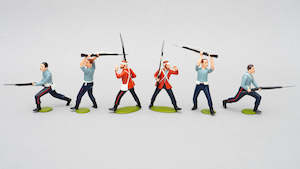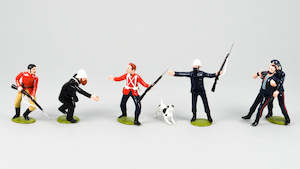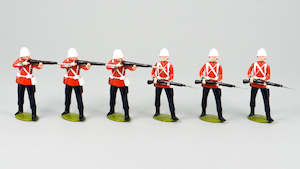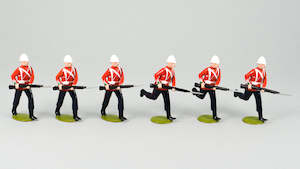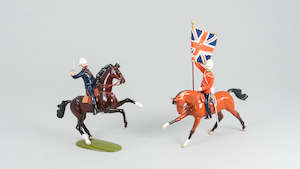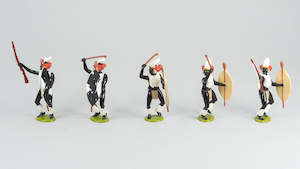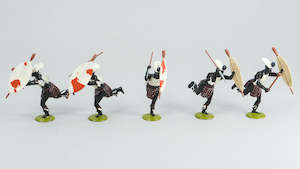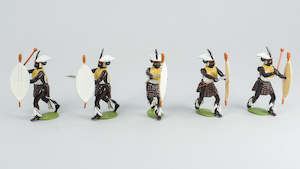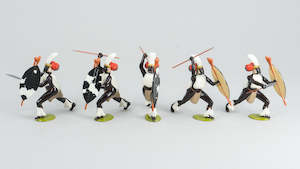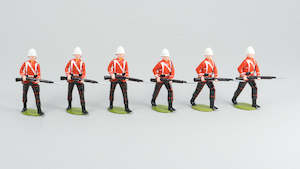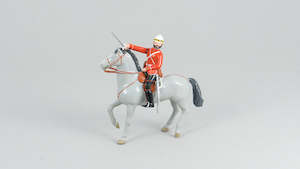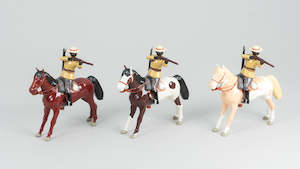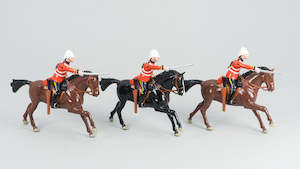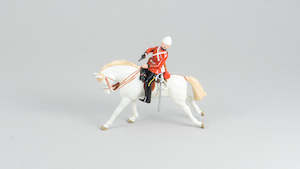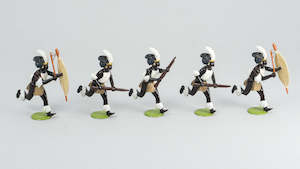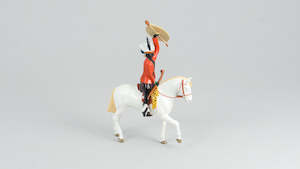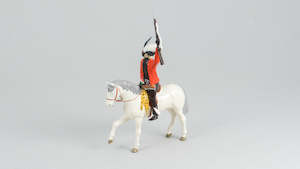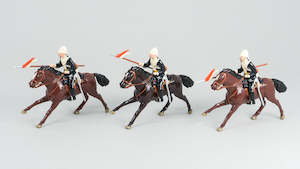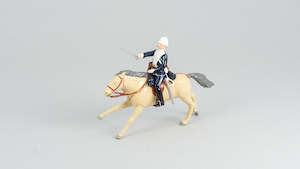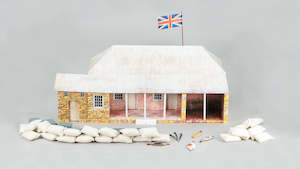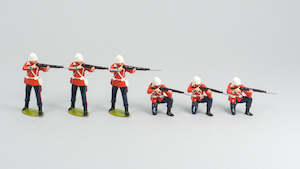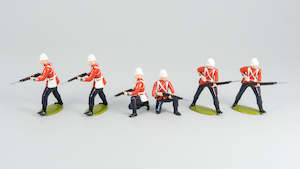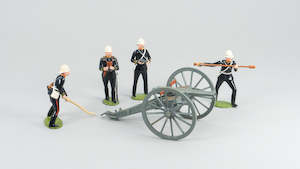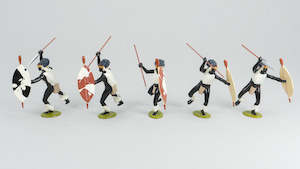Imperial Productions 1 views Claim this Business♡
×-
82 24th Foot, 1879Zulu War SeriesOn 21st January, 1879, the central column of Lord Chelmsford's three-pronged invasion into Zululand was attacked at Isandhlawana by 20,000 Zulu warriors. Included in the 1,700 British troops and native allies killed in the successful surprise attack were 581 men and 21 officers from f...Visit Store ⊕ More like this 0 0
-
$24041.1 The Brave Defenders of Rorke's Drift, 1879 (Personality Set)Zulu War SeriesLeft to guard a river crossing, stores, and the sick, a small garrison of British troops found themselves standing between the Zulu nation and Natal. The date was January 22, 1879. The place, Rorke's Drift.Lieutenant Chard of the Royal Engineers had been repairing damage to nearby pon...Buy from Store ⊕ More like this 0 0
-
41.2 The Brave Defenders of Rorke's Drift, 1879. 24th FootZulu War SeriesLeft to guard a river crossing, stores, and the sick, a small garrison of British troops found themselves standing between the Zulu nation and Natal. The date was January 22, 1879. The place, Rorke's Drift.Lieutenant Chard of the Royal Engineers had been repairing damage to nearby pon...Visit Store ⊕ More like this 0 0
-
41.3 The Brave Defenders of Rorke's Drift, 1879. 24th FootZulu War SeriesLeft to guard a river crossing, stores, and the sick, a small garrison of British troops found themselves standing between the Zulu nation and Natal. The date was January 22, 1879. The place, Rorke's Drift.Lieutenant Chard of the Royal Engineers had been repairing damage to nearby pon...Visit Store ⊕ More like this 0 0
-
100 Saving the Colours at IsandhlwanaOn June 21, 1879, whilst advancing against the Zulu Army, Lord Chelmsford the British commander misreading the situation divided his forces, leaving one portion in camp at Isandhlwana and marching out with the other. On June 22 the camp was attacked by the main Zulu impi and a massacre ensued. Of th...Visit Store ⊕ More like this 0 0
-
145 Umbonambi-Zulu Regiment, 1879The Umbonambi regiment was formed between 1820 and 1827 by Shaka the Zulu leader. By the reign of Cetshwayo and the outbreak of the Zulu War these warriors were mostly older veterans.They wore leopard skin headbands with monkey skin earflaps and feathers of the crested lourie, and often around their...Visit Store ⊕ More like this 0 0
-
29 iNdlondo-Zulu Regiment, 1879Formed in 1857, the iNdlondlo ‘washed’ their spears in the 1876 chastisement of a Tonga village. This entitled the regiment now older, to marry younger women, mostly spoken for, which led to much unrest, and helping to justify the 1879 war. Generally, the bachelor regiments were on the front lin...Visit Store ⊕ More like this 0 0
-
30 uThulwana-Zulu Regiment, 1879The uThulwana regiment, formed in 1854 contained many men of high status including King Cetshwayo. This was reflected in their lavish uniform, with a headdress of a single crane feather, isakabuli feathers on each side of the head and ostrich plumes. Shields were white with small marks of red or bla...Visit Store ⊕ More like this 0 0
-
31 uMbonambi-Zulu Regiment, 1879Formed between 1820 and 1827, and by the outbreak of the 1879 Zulu War, these warriors were considered mostly older veterans being well into their fifties.The uMbonambi carried a black shield of a ‘junior’ colour – retained throughout the regiment’s history. They wore feathers of the crested...Visit Store ⊕ More like this 0 0
-
32 91st Highlanders, 1879The 91st Highlanders arrived in Africa as reinforcements on 17th March, 1879. Under the overall command of Lord Chelmsford, they were marched to relieve Eshowe from a ten week Zulu siege, and on the morning of 2nd April at Gingindlovu, were attacked by a Zulu impi of ten thousand men.The Zulus attac...Visit Store ⊕ More like this 0 0
-
33 Officer, 91st Highlanders, 1879Raised in 1796 by General Duncan Campbell, the 91st was a storied regiment that served across the British Empire from the Napoleonic wars to India during the Sepoy Mutiny and extensive service in Africa, particularly during the Boer Wars and 8th Xhosa Wars in the mid-19th century.This officer wears ...Visit Store ⊕ More like this 0 0
-
34 Natal Native Horse, 1879With the shortage on Imperial forces in the early preparations for the Zulu Wars, the Natal Native Horse was raised by Durnford in 1878.Mostly the men were poorly equipped and armed except for the Edendale Contingent, 128 strong, from the Edendale Mission, all mounted and uniformed at their own expe...Visit Store ⊕ More like this 0 0
-
35 1st Dragoon Guards, 1879The 1st Dragoons arrived in Africa as part of the reinforcements gathered in response to the disastrous first invasion.They reached Rorke’s Drift on 20th May and the following day buried many of the dead at Isandhlwana. On the 2nd June one squadron discovered the body of the French Prince Imperial...Visit Store ⊕ More like this 0 0
-
36 Officer, 1st Dragoon Guards, 1879The 1st Dragoons arrived in Africa as part of the reinforcements gathered in response to the disastrous first invasion.They reached Rorke’s Drift on 20th May and the following day buried many of the dead at Isandhlwana. On the 2nd June one squadron discovered the body of the French Prince Imperial...Visit Store ⊕ More like this 0 0
-
37 iNluyengwe-Zulu Regiment, 1879The iNdluyengwe were formed in 1866. In 1879 this bachelor regiment with an average age of thirty years, was identified by black shields with a large white spot, and their headdress which included sakabuli feathers over the ears, and black and white ostrich feathers.Two figures in this set carry bat...Visit Store ⊕ More like this 0 0
-
38a Zulu Chief with shield, 1879These figures depict Zulu war chiefs, mounted on horses with European tack and saddle and wearing the scarlet tunics of English soldiers, each presumably liberated from the vanquished Anglo-led forces at Isandhlwana.Both figures wear headdresses similar to the uThulwana Regiment, which fought at Isa...Visit Store ⊕ More like this 0 0
-
38b Zulu Chief with rifle, 1879These figures depict Zulu war chiefs, mounted on horses with European tack and saddle and wearing the scarlet tunics of English soldiers, each presumably liberated from the vanquished Anglo-led forces at Isandhlwana.Both figures wear headdresses similar to the uThulwana Regiment, which fought at Isa...Visit Store ⊕ More like this 0 0
-
39 17th Lancers, 1879The 17th Lancers arrived at Rorke’s Drift in May, 1879. Under Col. Drury-Lowe they formed part of the rearguard on the march to Ulundi.At the Battle of Ulundi, Lord Chelmsford sensing the changed tempo of the Zulu charges, waved his helmet at the 17th Lancers Commander and cried “Go at them, Low...Visit Store ⊕ More like this 0 0
-
40 Officer, 17th Lancers, 1879The 17th Lancers arrived at Rorke’s Drift in May, 1879. Under Col. Drury-Lowe they formed part of the rearguard on the march to Ulundi.At the Battle of Ulundi, Lord Chelmsford sensing the changed tempo of the Zulu charges, waved his helmet at the 17th Lancers Commander and cried “Go at them, Low...Visit Store ⊕ More like this 0 0
-
42 The Storehouse of Rorke's DriftOn the afternoon of January 22, 1879, 140 men, mostly of the 24th Foot, prepared to meet the impending attack of 4000 Zulu warriors, at the Rorke’s Drift mission station.The mission had been originally established in 1850 by a trader named Jim Rorke. This had been taken over in the 1870’s by a S...Visit Store ⊕ More like this 0 0
-
43 24th Foot, add on set to No. 41On 21st January 1879, the central column of Lord Chelmsford’s three-pronged invasion into Zululand was attacked at Isandhlwana by 20,000 Zulu warriors. Included in the 1700 British troops and native allies killed in the successful surprise attack, were 581 men and 21 officers from five companies o...Visit Store ⊕ More like this 0 0
-
44 24th Foot, 1879, add on set to No. 41 & 43On 21st January 1879, the central column of Lord Chelmsford’s three-pronged invasion into Zululand was attacked at Isandhlwana by 20,000 Zulu warriors. Included in the 1700 British troops and native allies killed in the successful surprise attack, were 581 men and 21 officers from five companies o...Visit Store ⊕ More like this 0 0
-
45 Royal Field Artillery, 1879At Ulundi, on 4th July 1879, Lord Chelmsford’s forces had formed a square to meet the Zulu army. All six 9 pounder guns of the No.6 Battery, Royal Field Artillery were present. These and other artillery were placed to cover all directions of attack.The Zulu advanced to the thunderous drumming of a...Visit Store ⊕ More like this 0 0
-
60 inGobamaskhosi-Zulu RegimentThe inGobamakhosi regiment was formed in 1873 of men between twenty three and twenty six years of age. A favourite regiment of the King, it numbered about six thousand men at the battle of Isandhlwana, 1879.The regimental head-dress was a leopard skin head-band supporting cheek pieces and back piece...Visit Store ⊕ More like this 0 0
×

